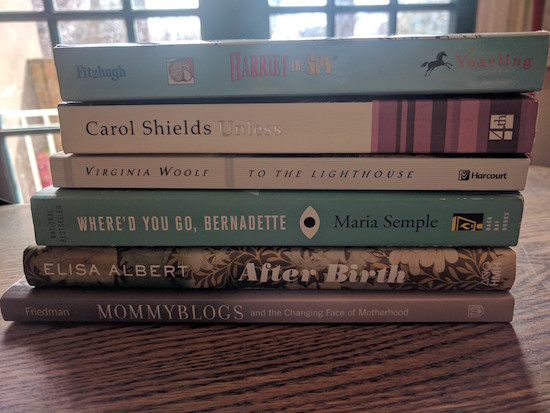March 12, 2017
Literary Coattails

I had this plan that I would be blogging about things other than my book when my book came out, possibly the same way I’d once upon a time planned to not be a person who posts copious photos of her children on social media. But those kinds of plans aren’t always rooted in reality. My whole approach to blogging is that you blog about what’s in front of you, and the book is everything right now. If I were blogging about things other than Mitzi Bytes at this moment in time, that would be inauthentic.
And today I’m thinking about the books that are Mitzi Bytes‘ literary foremothers. On International Women’s Day, Jessica Rose posted a photo of a page from Mitzi Bytes (with brackets. Someone drew brackets in my book. This is huge) and it reminded me that I’d written that part of the novel under the influence of After Birth, by Elisa Albert. This was in the second draft, written in the spring of 2015, when it was beginning to get warm but there weren’t yet leaves on the trees. I spent Sundays at Robarts library writing this draft, and I think this was added because I wanted to show more of her process as a blogger. I was inspired by the rage in After Birth (and its treatment of female relationships) and wanted to convey that same feeling, but it was also inspired by Reta Winters’ rage in Carol Shields’ Unless. At some point my character says, “It’s because I’m a woman,” the same way that Reta Winters thinks her daughter’s trauma comes down gender and oppression. And it does, but it’s more complicated than that. Like Carol Shields, I wanted to write a woman who didn’t always see the whole picture. (Because who always sees the whole picture?)
And like Louise Fitzhugh did in her novel Harriet the Spy (which I didn’t read until I was 27, but then I named my firstborn after it and wrote a book in homage to it—what an impression…) I wanted to write a character who doesn’t learn her lesson and change at the end. This is still controversial and frustrates readers. And it’s why I feel very lucky to have found an editor who supported this aim of my project, who recognized that this radical notion was essential to the book. I suppose it’s another thing I admire about Maria Semple’s Where’d You Go, Bernadette? too, along with all its other goodness. Bernadette is suffering from depression and admitting that and beginning to get over that will be important to her—but she’ll still kind of always been an asshole. And there are people who love her anyway. I wanted to write a person like it. (It is distinctly possible that I am a person like that.)
And speaking of Bernadette, oh, that book. The book I stayed up all night reading the night after Iris was born, and I just loved it so completely that I secretly resented every other book for not being Bernadette for months afterwards. As I read it I also knew that this was kind of novel I wanted to write—a novel that was smart and funny at once. I reread it perhaps a year later to discover if it was really as good as I remembered, or if it had just been the pain meds. And it was just as good. Only thing, it dawned on me that my work might never reach such levels of greatness, which left me despondent for about five minutes. And then I got over it, and thanked my lucky Semples for the inspiration.
Another book that’s been so important to me is Mommyblogs and the Changing Face of Motherhood, by May Friedman, from which I got the phrase “critical uncertainty in practice,” which pretty much underlines everything I ever get up to. Friedman’s book is a wonderful history of women in blogging and one of the most excellent books about feminism I’ve ever read. (She has also become my friend, and I feel so extraordinarily lucky that endorsement is on the back of my book.)
And finally To the Lighthouse, by Virginia Woolf, which ended up in my novel because I reread it the summer I wrote the novel (and like my character, I’d just bought a new copy and replaced the old one with my childish and embarrassing marginalia). I think it is possible that I might be able to weave themes from To the Lighthouse into every project I ever write. The questions Woolf poses about who women are and how they are seen and how they spend their time and their preoccupations are no closer to being answered for than they were a hundred years ago. But those questions themselves and the ideas they are inspire remain oh so rich.






This post helps me understand what you are going for in Mitzi Bytes and how it is important that the character not be forced to change her ways, even if it may be upsetting to readers. I will keep that in mind when I am able to read the novel.
At the “Eh List” Author event last night, I wasn’t able to note down the two authors who were particularly inspiring to you while writing. I think one was Semple, but could you job my memory on the other one? Thanks so much.
I really like the comment on Unless in your post where Reta is both correct that oppression of women is a huge issue and yet isn’t really at the core of what is wrong with her daught. This is something I mentioned in passing in my own meandering review of Unless: http://erics-hangout.blogspot.ca/2016/12/10th-canadian-challenge-11th-review.html
The shoutout to To The Lighthouse is also most welcome. I’ve been meaning to reread this and Mrs. Dalloway, so this comes as a timely reminder.
Hi! Thanks for coming. The other author was Laurie Colwin. I love her.